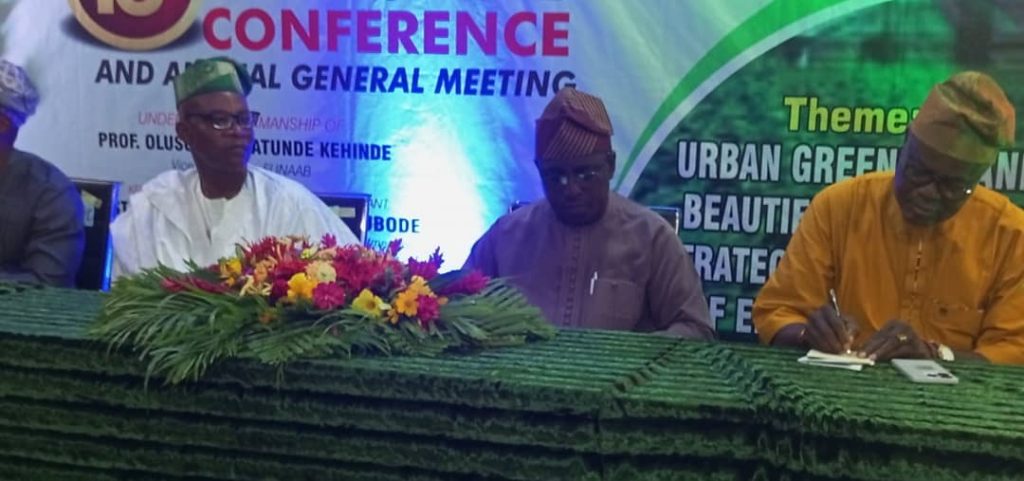Daud Olatunji
In a bid to combat the adverse effects of climate change in Nigeria, the Nigeria Institute of Landscape Horticulture (NILH) has urged the National Assembly to pass a law mandating homeowners to plant at least one tree within their premises.
The institute, recognizing the crucial role of trees in mitigating climate change and safeguarding the environment, emphasizes the need for a greenery environment as a strategy to control environmental pollution.
At the 16th National Conference and Annual General Meeting held at the Federal University of Agriculture, Abeokuta (FUNAAB), with the theme “Urban Greenery And Beautification As a Strategy For Control of Environmental Pollution And Climate Change,” the President of NILH, Kola Quadri, stressed the importance of such a law “at this critical time.”
Speaking to journalists, Quadri emphasized that climate change is a worrisome menace affecting the world, not exclusive to Nigeria.
The institute argues that implementing this law will play a pivotal role in curbing deforestation, improving air quality, reducing carbon emissions, and enhancing biodiversity.
President Quadri suggested a phased approach, stating, “the National Assembly should implement a law and make it mandatory for every homeowner to plant at least a tree at the front of their house.
” It should start from the local government, then the state should take it up.” He proposed that state assemblies pass the law and ensure penalties for defaulters.
“Climate change in Nigeria is a worrisome menace that is causing problems all over the world. The problem is not peculiar to Nigeria alone.
Echoing these sentiments, Comrade Emmanuel Bankole, the state Chairman of the Institute, emphasized the need to work with policymakers at all levels to address the effects of climate change.
“We will work with the government at all levels to ensure that global warming is seriously mitigated so that we can preserve our environment for ourselves and the coming generation.
“We don’t just want to keep talking, we are moving to mitigate the effects of climate change. We are drawing the attention of policy makers to the importance of global warming.
Dr. Elizabeth Augustus, the Keynote Speaker at the event and the Provost of the Federal College of Agriculture, Ibadan, highlighted that increased tree cover in residential areas contributes to enhanced aesthetics, fostering a sense of community pride and wellness.
The NILH’s initiative not only draws attention to the effects of climate change but also actively engages in mitigating its impact, aligning with the global call for environmental sustainability.
Meanwhile,Bolu Owotomo, Commissioner of the Ministry of Agriculture, highlighted the Ogun State Government’s commitment to collaborating with the institute to enhance the greenery and beautification of urban areas.
He said that Governor Dapo Abiodun’s administration is determined to combat environmental pollution and climate change through proactive measures.
Owotomo emphasized the critical role of sustainable landscaping practices, stating that the government would work closely with the National Institute of Landscape Horticulturists to train and certify horticulturists in sustainable landscape management techniques.
He added that the focus is on creating visually appealing and environmentally friendly spaces that contribute to the fight against climate change.
According to him, the governor’s administration has launched public campaigns promoting tree planting, waste management, and energy conservation, encouraging citizen engagement in creating a greener and more sustainable future.
Owotomo expressed confidence that these initiatives would foster a collective movement toward environmental conservation.
Addressing the theme of the conference, “Urban Greenery and Beautification as Strategy for Control of Environmental Pollution and Climate Change,” Owotomo stressed the global significance of addressing environmental degradation and deforestation.
The conference highlighted the collective responsibility required to safeguard the environment for future generations.
Recognizing the challenges posed by a growing population and increased resource consumption, the Ogun State Government is implementing measures to control carbon emissions.
This includes a multi-modal Transportation Master Plan and the introduction of Compressed Natural Gas (CNG) Powered Mass Transit Buses – a first in Nigeria.
The adoption of CNG demonstrates the government’s commitment to reducing carbon emissions and promoting sustainable development.
Owotomo concluded by emphasizing the complexity of the challenges and the need for a collaborative approach involving government agencies, private sector organizations, civil society, and the general public.
The Ogun State Government seeks to leverage partnerships and collaboration to develop innovative solutions that address environmental pollution and climate change, ultimately working towards a cleaner, greener, and more sustainable world for current and future generations.
Do you want to share a story with us? Do you want to advertise with us? Do you need publicity for a product, service, or event? Contact us on WhatsApp +2348183319097 Email: platformtimes@gmail.com
We are committed to impactful investigative journalism for human interest and social justice. Your donation will help us tell more stories. Kindly donate any amount HERE



